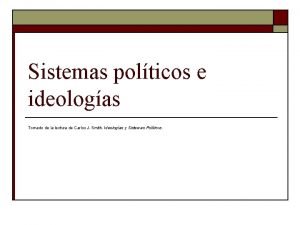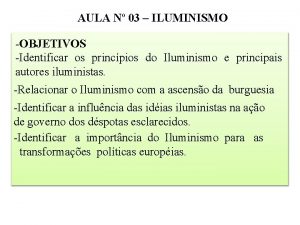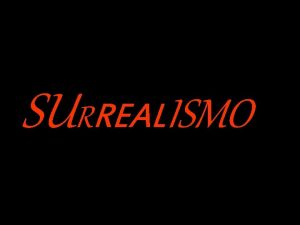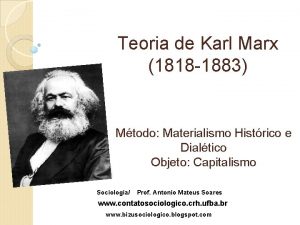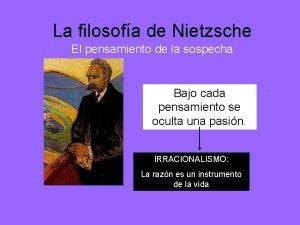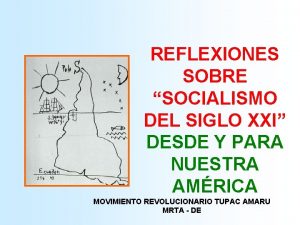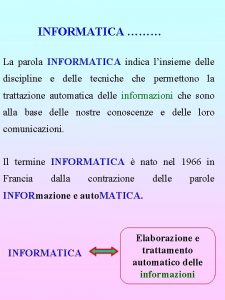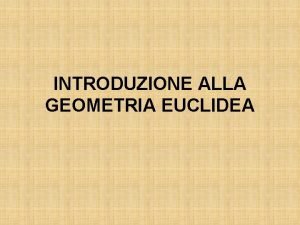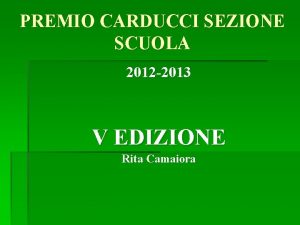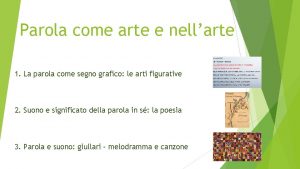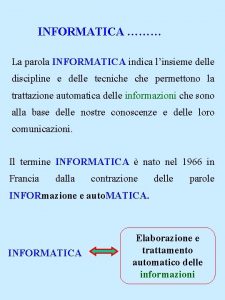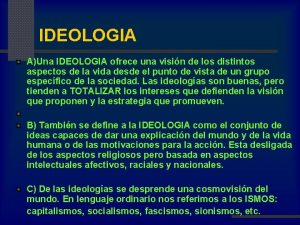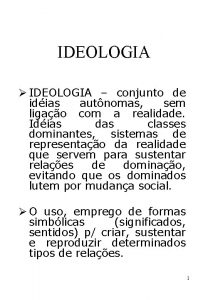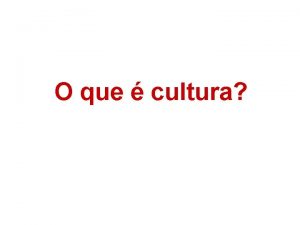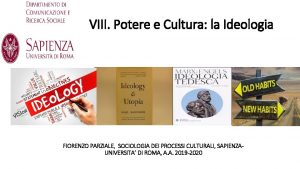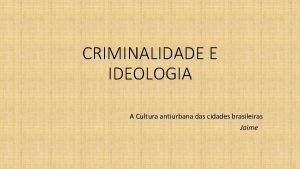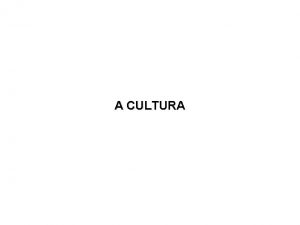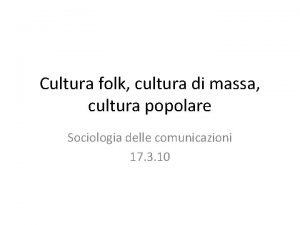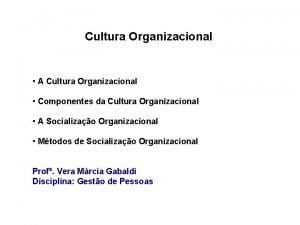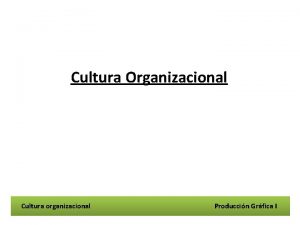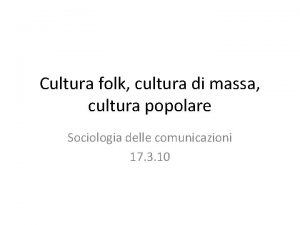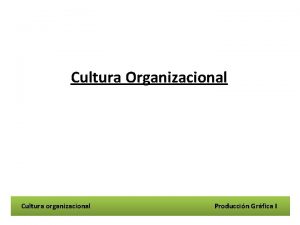Tra lingua e cultura tra parola e ideologia


















![Tabù sessuali (1) § Cambridge Int Dict of Eng 1995: FUCK: [EXTREME ANGER] exclamation Tabù sessuali (1) § Cambridge Int Dict of Eng 1995: FUCK: [EXTREME ANGER] exclamation](https://slidetodoc.com/presentation_image_h2/714f04a832088241fb7450b0a7798c4a/image-19.jpg)







- Slides: 26

Tra lingua e cultura, tra parola e ideologia nella tradizione lessicografica inglese Giovanni Iamartino (Università di Milano)

Dictionaries only succeed because of an act of faith on the part of their users, and that act of faith is dependent on those users believing their dictionaries both authoritative and beyond subjectivity. Rosamund Moon

Articolazione del discorso: 1) il lessicografo 2) la lessicografia inglese 3) la lessicografia anglo-italiana 4) prospettive del presente

Lexicographer: A writer of dictionaries; a harmless drudge, that busies himself in tracing the original, and detailing the signification of words. . S. Johnson

CODICE LINGUISTICO LESSICOGRAFO DIZIONARIO REALTA’ EXTRALINGUISTICA UTENTE

Richard Cawdrey A Table Alphabeticall (1604) Obdurate Obeisance Object Oblation Oblectation Obliged Oblique Oblivious NON Oak-tree Oats Obey



Oxford English Dictionary - Richard C. Trench (1857): “He is a historian of it, not a critic” - 125 fascicoli dal 1884 al 1932 - James Murray (1837 -1915) - 4 supplementi negli anni ’ 70 -’ 80 - 2 nd edn. 1989 - 3 rd edn. 2015?

Lord Chesterfield, The World, n. 101 I give my vote for Mr Johnson to fill that great and arduous post. And I hereby declare, I make a total surrender of all my rights and privileges in the English language, as a freeborn British subject, to the said Mr Johnson, during the term of his dictatorship.

dal Dictionary: To BANG: . . . To beat; to thump; to cudgel: a low and familiar word. . BLACK-GUARD: . . . A cant word amongst the vulgar; by which is implied a dirty fellow; of the meanest kind. To CON: . . . To study; to commit to memory; to fix in the mind. It is a word now little in use, except in ludicrous language. To DOFF: . . . This word is in all its senses obsolete, and scarcely used except by rusticks. IMMATERIAL: . . . 1. Incorporeal; distinct from matter; void of matter. 2. Unimportant; without weight; impertinent; without relation. This sense has crept into the conversation and writings of barbarians; but ought utterly to be rejected.

dal Dictionary: JOB: . . . A low word now much in use, of which I cannot tell the etymology. . PAT: . . . Fit, convenient; exactly suitable either as to time or place. This is a low word, and should not be used but in burlesque writings. . SHABBY: . . . A word that has crept into conversation and low writing; but ought not to be admitted into the language. SLIM: . . . A cant word as it seems, and therefore not to be used. SPICK AND SPAN: This word I should not have expected to have found authorised by a polite writer. . . it is however a low word. . STARK: . . . It is now little used but in low language. TRAIT: . . . A stroke; a touch. Scarce English.

dal Dictionary: COMPLIMENT: . . . An act, or expression of civility, usually understood to include some hypocrisy, and to mean less that it declares. EXCISE: . . . A hateful tax levied upon commodities, and adjudged not by the common judges of property, but wretches hired by those to whom excise is paid. OATS: A grain, which in England is generally given to horses, but in Scotland supports the people. . PATRON: . . . One who countenances, supports or protects. Commonly a wretch who supports with insolence, and is paid with flattery. PENSION: . . . An allowance made to any one without an equivalent. In England it is generally understood to mean pay given to a state hireling for treason to his country. . PENSIONER: . . . 2. A slave of state hired by a stipend to obey his master. .

Esordi della lessicografia anglo-italiana § William Thomas (1550) § John Florio (1558) (1611) § Giovanni Torriano (1659) § Ferdinando Altieri (1726 -27; 1750) § Giuseppe Baretti (1760)

Da Altieri a Baretti: A>B= RABBLE: . . . la canaglia, il popolaccio, la plebe, la feccia del popolo, che tumultua e fa fracasso. B= To CABBAGE: . . . rubare i ritagli del panno, come fanno i garzoni de’ sartori che con facezia degna d’essi dicono che il denaro ricavato da que’ rubati ritagli serve loro per comprare i cavoli da mangiare col loro bue salato. Arbuthnot. B= TRADESFOLK: gente data al mercanteggiare; gente vile, canaglia sciocca al vil guadagno intenta. A>B= PETTIFOGGER: un avvocato o procuratore ignorante, un procuratorello, un beccalite, uno storcileggi, dottoretto di grande audacia, di poco sapere, e di molta voglia di rubare a’ clienti. (ed. Venezia 1795: . . . mozzorecchi, dottoricchio, . . . ) B= Widowhunter: uno che amoreggia vedove per la dote, un Irlandese.

Da Altieri a Baretti (via Johnson): J= TORY: One who adheres to the ancient constitution of the state, and the apostolical hierarchy of the church of England: opposed to a whig. B= TORY: colui che in Inghilterra aderisce o pretende aderire alle antiche leggi e all’apostolica Gerarchia della chiesa Anglicana. Il suo opposto chiamasi Whig. J= WHIG: The name of a faction B= WHIG: setta di Politici in Inghilterra, i di cui principj sono dannati da i tory loro nemici che li dipingono come gente per lo più di mala morale, di nulla religione, e d’inclinazioni repubblichesche. A>B= QUAKERS: setta di pazzi in Inghilterra, così detti per li strani gesti che fanno tremando. A= PAPIST: . . . papista, cattolico romano. B= PAPIST: . . . papista nome di dispregio dato a un cattolico romano. A= POPERY: . . . il papismo. B= POPERY: papismo. Gl’Inglesi Protestanti per derisione chiamano Papismo la religione Cattolica Romana, per rifarsi di quell’Eretico che noi diam loro tanto continuamente pel capo. Carità cristiana da ambidue i lati.

La sanzione ideologico-culturale del lessicografo § l’esclusione dal lemmario § le parole marchiate: a) tabù sessuali b) tabù religiosi c) tabù politici d) tabù etnici e) tabù sessisti

L’esclusione dal lemmario: § F. Grose, Classical Dictionary of the Vulgar Tongue (1796): C**T: a nasty name for a nasty thing § E. Partridge, Slang Yesterday and Today (1937): My rule, in the matter of unpleasant terms, has been to deal with them as briefly, as astringently, as aseptically as was consistent with clarity and adequacy; in a few instances, I had to force myself to overcome an instinctive repugnance.
![Tabù sessuali 1 Cambridge Int Dict of Eng 1995 FUCK EXTREME ANGER exclamation Tabù sessuali (1) § Cambridge Int Dict of Eng 1995: FUCK: [EXTREME ANGER] exclamation](https://slidetodoc.com/presentation_image_h2/714f04a832088241fb7450b0a7798c4a/image-19.jpg)
Tabù sessuali (1) § Cambridge Int Dict of Eng 1995: FUCK: [EXTREME ANGER] exclamation taboo used when expressing extreme anger or annoyance to add force to what is being said § Collins Cobuild Eng Dict Adv Lear 2001: FUCK [ Fuck is a rude and offensive word which you should avoid using] 1 Fuck is used to express anger or annoyance. VERY RUDE § Macmillan 2002: FUCK: offensive. An extremely offensive expression that means… / used for… § Longman Dict. Cont. Engl. 2003: FUCK: taboo spoken used to show that you are very angry at something or someone, or that you do not care about them at all

Tabù politici Oxford Advanced Learner’s Dictionary of Current English (3 rd edn. 1974) (Russian edition) § CAPITALISM: a) economic system in which a country’s trade and industry are organized and controlled by the owners of capital, the chief elements being competition, profit, supply and demand. b) an economic and social system based on private ownership of the means of production operated for private profit and on the exploitation of man by man. § COMMUNISM: a) ideology that proclaims the abolition of class oppression and exploitation, and the foundation of a society based on the common possession of the means of production and the equal distribution of goods. b) a theory revealing the historical necessity for the revolutionary replacement of capitalism by Communism. § IMPERIALISM: a) belief in the value of colonies; policies of extending a country’s empire and influence. b) the highest and last stage of capitalism. § INTERNATIONALISM: a) the doctrine that the common interests of nations are greater and more important than their differences. b) the solidarity of the working people of different countries in their struggle with capitalism.

Tabù etnici Nigger > Black > Coloured > Negro > Black > Afro-american > African-american > Member of the African Diaspora § Concise Oxford Dictionary (1911) SUBJECT: … The Indians are our subjects § Collins CED 1995: … his subjects regarded him as a great and wise monarch § LDCE 1995: … a British subject

Tabù sessisti (1) LDCE 1995: § BUZZ: … She buzzed for her secretary § BATH: … He’s bathing the baby § (? ) To PAT: … He patted his hair into place Thorndike Barnhart Beginning Dictionary (1968) The Scott Foresman Beginning Dictionary (1983) : CHECK: When we finished eating, Father asked the waitress for the check. After we finished eating, the waiter brought the check to our table. CHERISH: A mother cherishes her baby Parents cherish their children. SEIZE: In fright she seized his arm. In fright I seized her arm.

Altre componenti ideologiche nel dizionario § frontespizio § pagina § sequenza delle voci § etimologia § definizioni § etichette e note d’uso § esempi

Johnson’s Dictionary, Preface: … to pursue perfection was, like the first inhabitants of Arcadia, to chace the sun, which, when they had reached the hill where he seemed to rest, was still beheld at the same distance from him

Johnson’s letter to F. Sastres, 1784: Dictionaries are like watches, the worst is better than none, and the best cannot be expected to go quite true.

Qualche riferimento bibliografico § § § § § Beaujot, J-P. , “Dictionnaire et idéologie”, in Hausmann, F. J. et al. , Wörterbücher Dictionaries - Dictionnaires, 3 voll. , de Gruyter, Berlin-New York 1989 -1991, vol. 1, pp. 7988. Julio Casares, Introduccion a la lexicografia moderna, s. e. , Madrid 1969 (1 a ed. 1950) Delbridge, A. & P. H. Peters, “Dictator, Gatekeeper, Tally Clerk Or Harmless Drudge? ”, in T. L. Burton & J. Burton, eds. , Lexicographical and Linguistic Studies. Essays in Honour of G. W. Turner, Brewer, Cambridge 1988, pp. 33 -41. D’Oria, D. , Dictionnaire et ideologie, Schena-Nizet, Fasano(BA)-Paris 1988. Hartmann, R. R. K. ed. , LEXeter ’ 83 Proceedings. Papers from the International Conference on Lexicography at Exeter, 9 -12 September 1983, Niemeyer, Tübingen 1984. Iamartino, G. , Da Thomas a Baretti: i primi due secoli della lessicografia angloitaliana, Pubblicazioni dell’I. S. U. Università Cattolica, Milano 1994. Landau, S. I. , The expression of changing social values in dictionaries, “Dictionaries”, 5, 1985, pp. 261 -269. Moon, R. , Objective or Objectionable: Ideological Aspects of Dictionaries, “English Language Research Journal (University of Birmingham)”, 3, 1989, p. 59 ss. Sacerdoti Mariani, G. , “Word-malformations and the authoritarian attitude towards language usage”, in R. Bacchielli, ed. , Historical English Word-formation. Papers read at the Sixth National Conference of the History of English (Urbino, 24 -25 September 1993), Quattroventi, Urbino 1994, pp. 153 -163. Wells, R. A. , Dictionaries and the Authoritarian Tradition. A Study in English Usage and Lexicography, Mouton, The Hague-Paris 1973.
 Ideologia augustea
Ideologia augustea Apprendimento linguistico unior
Apprendimento linguistico unior Ideologia politica
Ideologia politica Os princípios do iluminismo
Os princípios do iluminismo Comecon nedir
Comecon nedir Tekstin ideologia
Tekstin ideologia Para medir o ângulo dalila
Para medir o ângulo dalila Surrealismo ideologia
Surrealismo ideologia Conceito de alienação
Conceito de alienação Vitalismo ejemplos
Vitalismo ejemplos Ideologia comunista
Ideologia comunista Ideologia politica
Ideologia politica Ideologia gender na czym polega
Ideologia gender na czym polega Jose carlos mariategui ideologia
Jose carlos mariategui ideologia Surrealismo ideologia
Surrealismo ideologia Parola informatica
Parola informatica Acrostici sul bullismo
Acrostici sul bullismo Parola barocco
Parola barocco Introduzione alla geometria solida
Introduzione alla geometria solida Bibbia deriva dal greco
Bibbia deriva dal greco Cielo nuovo è la tua parola
Cielo nuovo è la tua parola La parola bibbia deriva dal greco
La parola bibbia deriva dal greco Torcere il collo all'eloquenza
Torcere il collo all'eloquenza La parola nell'arte
La parola nell'arte I nomi derivati di pane
I nomi derivati di pane Etimologia della parola barocco
Etimologia della parola barocco Parola informatica
Parola informatica


